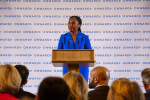
It’s reasonably rare for elections to completely change which party runs the country. Labour’s landslide means that the Parliamentary arithmetic has completely shifted and as a consequence the appetites and interests of many Members of Parliament will also start to evolve.
A marginal Parliament (as was elected in 2015 and 2017) gives MPs huge influence over the governmental agenda. That can take time, energy, and co-ordination capacity away from engaging with externally inspired campaigns.
But the sheer size of Labour’s victory means this will likely be a predictable Parliament, and that will create a hunger for external campaigns. If you’re in the business of seeking to support, inform and advocate for issues in the Commons or the Lords then this summer recess is the ideal time to reset your public affairs strategy.
Of his 403 Labour MPs, Prime Minister Starmer has appointed 111 to serve as Ministers – that leaves 292 government-backing backbenchers. Most will never get the chance to serve as a Minister.
The vast majority of his MPs will be consistently loyal – grateful to the Prime Minister for his role in getting them elected and supportive of their manifesto platform. Even the grumpiest ensemble of rebel Labour MPs will be unlikely to defeat Starmer: the government has an effective working majority of 167 votes in the Commons. A whopping 84 MPs would need to rebel to defeat the government. Whilst not impossible, it remains highly unlikely that the Government’s agenda will be frustrated.
So, for the most part this Parliament the votes will be lacking in controversy. Labour should win most Commons divisions comfortably, and while it’s to be expected that the opposition parties will get frustrated the same restlessness will likely also affect hundreds of backbench Labour MPs.
Some will have been elected with a political mission, a core cause that’s the reason they sought public office in the first place. But many if not most will be generalists, seeking to serve in the round and use their skills for a variety of knotty political problems.
This presents an golden opening for outside campaigners. The vast majority of MPs are highly motivated and ambitious. So those 292 Labour backbenchers will be constantly on the hunt for ideas, open to campaign approaches aligned to their interests that they could use to lodge a Prime Minister’s Question, inspire a Westminster Hall debate and take in to the Newsnight or LBC studios.
By the time the 2029 General Election comes around, it’s not inconceivable that Labour loses 100 constituencies or more. This possibility will not elude many incumbent Labour MPs for long and so they’ll not want to wait to make their mark in this Parliament.
So this summer we should get busy, preparing ourselves for a Parliament of keen MPs seeking inspiration. Public affairs professionals are well-placed to support them with a host of different causes and issues to consider campaigning on.
If you can make your campaigns creative and engaging, then the response from this intake of campaign hungry MPs will likely to be a positive one.


